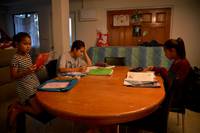Theme 7: Models of non-school based learning spaces and practicum in the context of the COVID-19 pandemic and beyond, including non-formal education and youth work.
Thematic lead: Ismi Bin Ismail
Co lead: Steven Eric Krauss
Peer Reviewer: Miriam Teuma. Manuel Souto-Otero and Alphonce Omolo
Lead Organisation: Universiti Putra Malaysia
“Youth Work-ing in a Pandemic: The Roles and Practices of Youth Workers as Non-School Based Education Providers During the COVID-19 Pandemic”
Background
The COVID-19 pandemic has created a host of new challenges for young people. In addition to the health threat posed by the virus itself, mental health issues, unemployment and social alienation have risen dramatically due to social distancing, and the mass closings of businesses, schools, universities, and public spaces. As countries grapple with these developments, non-school based learning spaces have gained new attention in an attempt to provide continuous educational support for young people during the pandemic. Under normal circumstances, youth workers are important providers of non-school based learning for young people. By providing critical emotional support, soft skills, and safe spaces for youth, particularly those from at-risk and marginalized backgrounds, youth workers utilize a combination of learning approaches that often combine informal, non-formal and even formal educational experiences in their work with youth. Little is known, however, as to how COVID-19 has affected youth workers’ roles and practices as non-school providers of education, and what pedagogies they are utilizing to provide critical support for young people during the pandemic.
Key Research Questions
Against this backdrop, this study aims to understand how COVID-19 has altered the ‘youth work space’, or the different strategies, methods and tools that youth workers are using to provide educational experiences for youth. The specific study questions are:
- How are youth workers engaging with youth during COVID-19? What tools and strategies do they employ to facilitate communication?
- What types of learning experiences are youth workers prioritizing during the pandemic?
- What are the challenges youth workers face in providing learning and other forms of support for youth during the pandemic? How do they overcome them?
*Picture courtesy of The Commonwealth Secretariat

